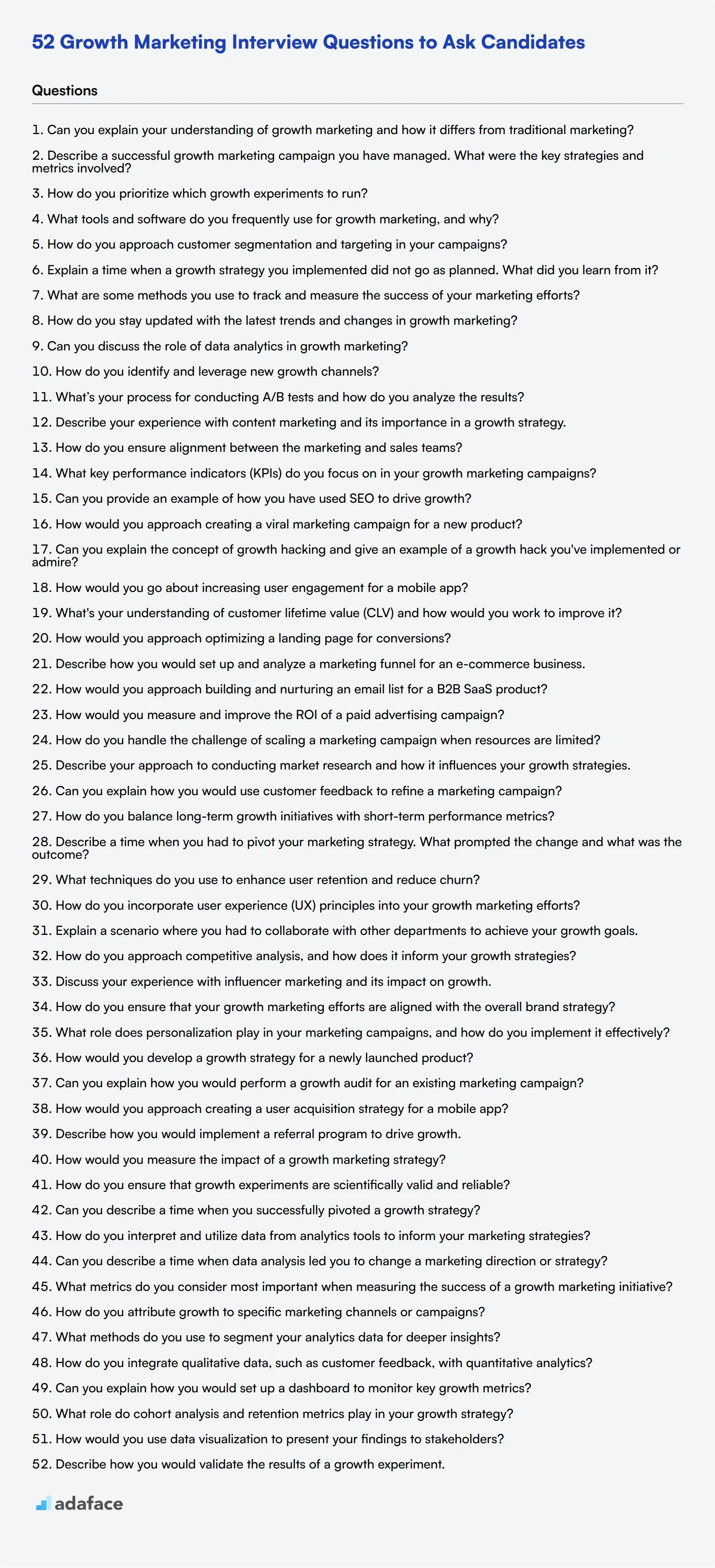Finding the right Growth Marketing talent can be a challenge in today's competitive landscape. Asking the right interview questions is key to identifying candidates with the skills required for growth marketers who can drive your company's expansion.
This blog post provides a comprehensive list of Growth Marketing interview questions tailored for different experience levels and areas of expertise. From general questions to specific inquiries about user acquisition and data analytics, we've got you covered.
Use these questions to gauge candidates' knowledge and problem-solving abilities effectively. Consider complementing your interviews with a Growth Marketing skills assessment to ensure a thorough evaluation of potential hires.
Table of contents
15 basic Growth Marketing interview questions and answers to assess candidates
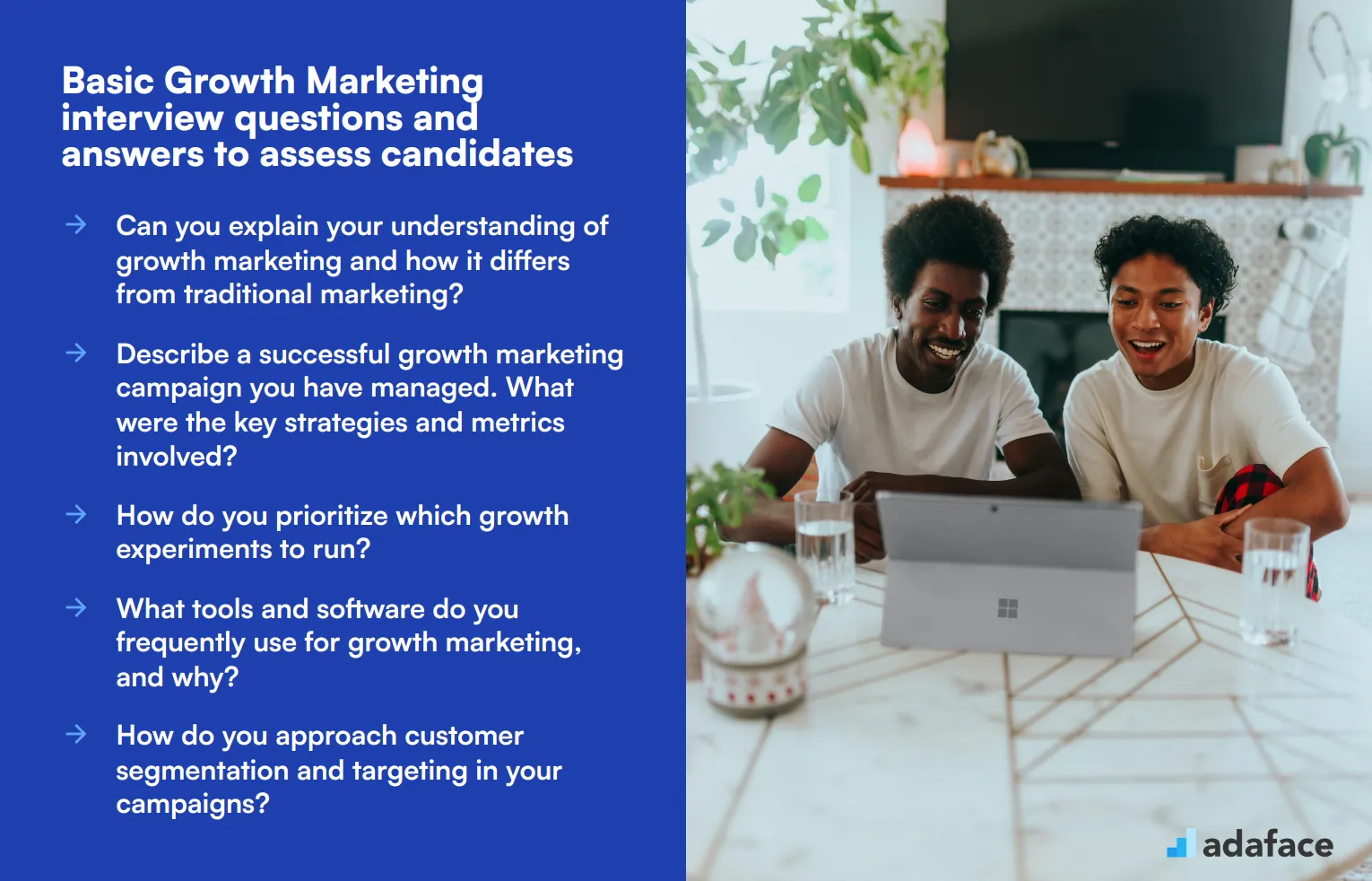
To determine if candidates possess the fundamental skills and knowledge to excel in a growth marketing role, ask them some of these essential Growth Marketing interview questions. These questions will help you assess their understanding and practical experience in driving business growth effectively. For more details on the role, check out this growth marketer job description.
- Can you explain your understanding of growth marketing and how it differs from traditional marketing?
- Describe a successful growth marketing campaign you have managed. What were the key strategies and metrics involved?
- How do you prioritize which growth experiments to run?
- What tools and software do you frequently use for growth marketing, and why?
- How do you approach customer segmentation and targeting in your campaigns?
- Explain a time when a growth strategy you implemented did not go as planned. What did you learn from it?
- What are some methods you use to track and measure the success of your marketing efforts?
- How do you stay updated with the latest trends and changes in growth marketing?
- Can you discuss the role of data analytics in growth marketing?
- How do you identify and leverage new growth channels?
- What’s your process for conducting A/B tests and how do you analyze the results?
- Describe your experience with content marketing and its importance in a growth strategy.
- How do you ensure alignment between the marketing and sales teams?
- What key performance indicators (KPIs) do you focus on in your growth marketing campaigns?
- Can you provide an example of how you have used SEO to drive growth?
8 Growth Marketing interview questions and answers to evaluate junior marketers
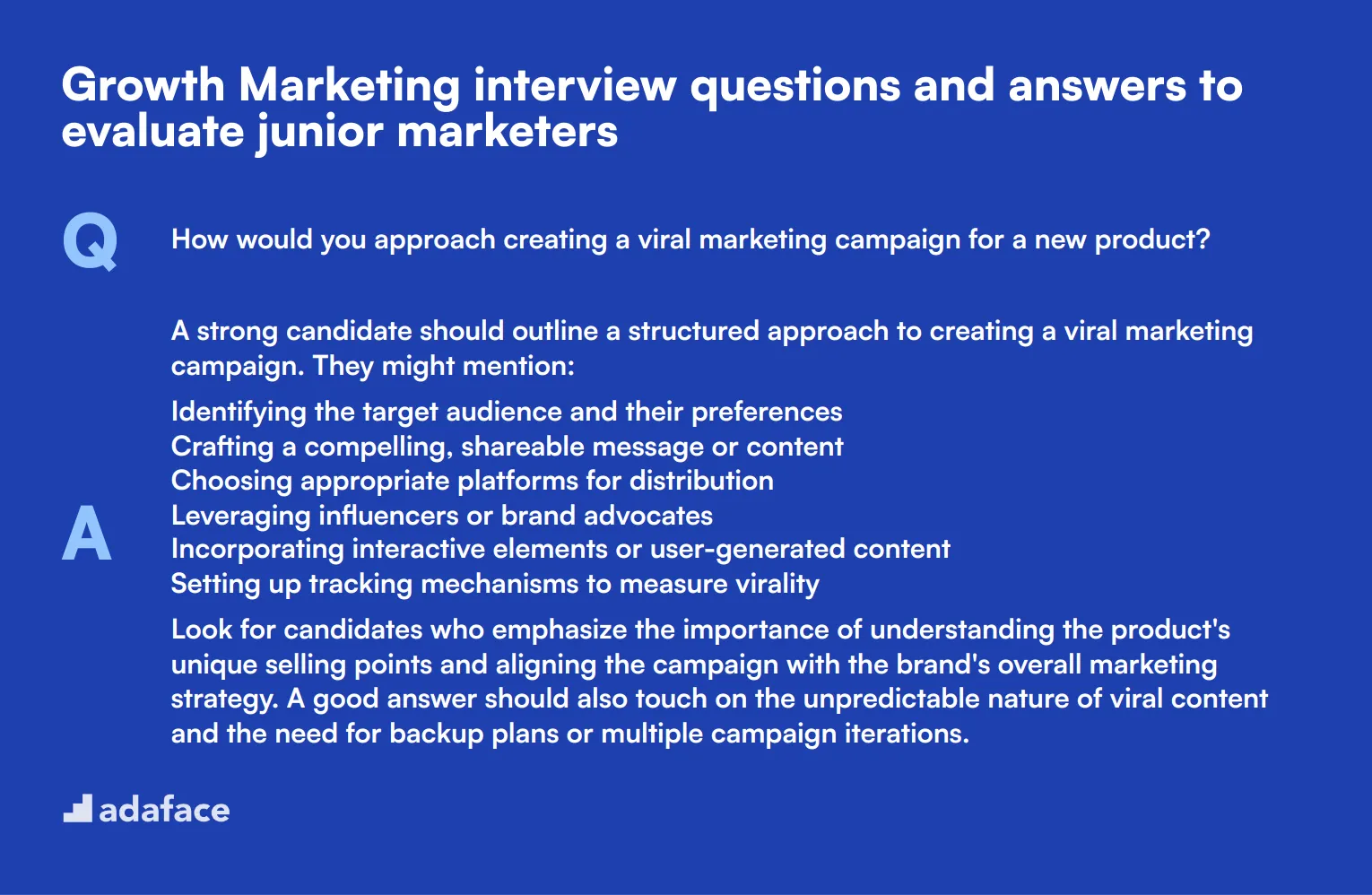
When interviewing junior growth marketers, it's crucial to assess their foundational knowledge and practical thinking. These eight questions will help you evaluate candidates' understanding of core concepts, their ability to apply growth strategies, and their potential to contribute to your team's success. Use this list to gauge the skills and mindset of entry-level growth marketing talent.
1. How would you approach creating a viral marketing campaign for a new product?
A strong candidate should outline a structured approach to creating a viral marketing campaign. They might mention:
- Identifying the target audience and their preferences
- Crafting a compelling, shareable message or content
- Choosing appropriate platforms for distribution
- Leveraging influencers or brand advocates
- Incorporating interactive elements or user-generated content
- Setting up tracking mechanisms to measure virality
Look for candidates who emphasize the importance of understanding the product's unique selling points and aligning the campaign with the brand's overall marketing strategy. A good answer should also touch on the unpredictable nature of viral content and the need for backup plans or multiple campaign iterations.
2. Can you explain the concept of growth hacking and give an example of a growth hack you've implemented or admire?
Growth hacking refers to the process of rapidly experimenting across marketing channels and product development to identify the most effective ways to grow a business. It typically involves creative, low-cost strategies to acquire and retain customers.
An example of a growth hack could be Dropbox's referral program, where users received additional free storage space for inviting friends. This incentivized existing users to spread the word and brought in new users at a low cost.
Look for candidates who can clearly explain the concept and provide relevant examples. Their answers should demonstrate an understanding of the iterative nature of growth hacking and the importance of measurable results.
3. How would you go about increasing user engagement for a mobile app?
A comprehensive answer should include strategies such as:
- Implementing push notifications for timely, relevant updates
- Creating in-app challenges or rewards to encourage regular use
- Personalizing the user experience based on behavior and preferences
- Regularly updating content or features to maintain interest
- Utilizing social features to increase stickiness
- Analyzing user data to identify and address drop-off points
Evaluate candidates based on their ability to think holistically about user engagement. Strong responses will consider both technical and psychological aspects of keeping users active and interested in the app.
4. What's your understanding of customer lifetime value (CLV) and how would you work to improve it?
Customer Lifetime Value (CLV) is the total worth of a customer to a business over the entire period of their relationship. It's an important metric that helps businesses understand how much they can spend on acquiring customers and the potential return on investment.
To improve CLV, candidates might suggest:
- Enhancing customer onboarding and education to increase product adoption
- Implementing loyalty programs or tiered pricing to encourage long-term commitment
- Providing excellent customer support to reduce churn
- Cross-selling and upselling relevant products or services
- Personalizing communication and offers based on customer data
- Continuously gathering and acting on customer feedback
Look for answers that demonstrate an understanding of the long-term nature of customer relationships and the balance between acquisition costs and customer value.
5. How would you approach optimizing a landing page for conversions?
A strong answer should include the following steps:
- Analyzing the current performance and identifying problem areas
- Clarifying the page's single conversion goal
- Crafting a compelling headline and clear value proposition
- Optimizing page load speed and mobile responsiveness
- Using persuasive copywriting techniques and strong calls-to-action
- Incorporating social proof elements like testimonials or trust badges
- Simplifying the form or conversion process
- Implementing A/B testing to compare different versions
Evaluate candidates based on their understanding of user experience principles, the importance of clear messaging, and their ability to think analytically about conversion optimization. Look for mentions of tools like heatmaps or user session recordings for deeper insights.
6. Describe how you would set up and analyze a marketing funnel for an e-commerce business.
A comprehensive answer should cover the following aspects:
- Defining the stages of the funnel (e.g., Awareness, Interest, Consideration, Purchase, Retention)
- Identifying key metrics for each stage (e.g., traffic sources, click-through rates, add-to-cart rate, conversion rate, repeat purchase rate)
- Setting up tracking tools like Google Analytics or a CRM system
- Creating content and campaigns tailored to each stage of the funnel
- Analyzing drop-off points and optimizing problematic areas
- Implementing retargeting strategies for users who don't convert
- Continuously testing and refining the funnel based on data
Look for candidates who understand the interconnected nature of the funnel stages and can explain how insights from one stage can inform strategies for others. Strong answers will also mention the importance of aligning the funnel with the customer journey.
7. How would you approach building and nurturing an email list for a B2B SaaS product?
A good response should include strategies such as:
- Creating valuable lead magnets like whitepapers, webinars, or free tools
- Optimizing website sign-up forms and using exit-intent popups
- Leveraging content marketing and SEO to attract potential subscribers
- Segmenting the email list based on subscriber behavior and preferences
- Developing a welcome series to onboard new subscribers
- Creating a content calendar for regular, valuable communications
- Implementing automation for targeted, timely emails
- Regularly cleaning the list to maintain high engagement rates
Evaluate candidates based on their understanding of B2B audience needs, the importance of providing value in every interaction, and their knowledge of email marketing best practices. Look for mentions of compliance with regulations like GDPR or CAN-SPAM.
8. How would you measure and improve the ROI of a paid advertising campaign?
A strong answer should cover the following points:
- Setting clear campaign objectives and KPIs
- Implementing proper tracking and attribution (e.g., UTM parameters, conversion tracking)
- Calculating ROI by comparing ad spend to revenue generated
- Analyzing performance metrics like click-through rate, conversion rate, and cost per acquisition
- A/B testing ad creatives, landing pages, and targeting options
- Optimizing bid strategies and budget allocation
- Refining audience targeting based on performance data
- Considering the customer lifetime value in ROI calculations
Look for candidates who demonstrate an understanding of the interplay between different marketing channels and the importance of holistic measurement. Strong answers will also mention the need for ongoing optimization and the ability to balance short-term results with long-term brand building.
12 intermediate Growth Marketing interview questions and answers to ask mid-tier marketers
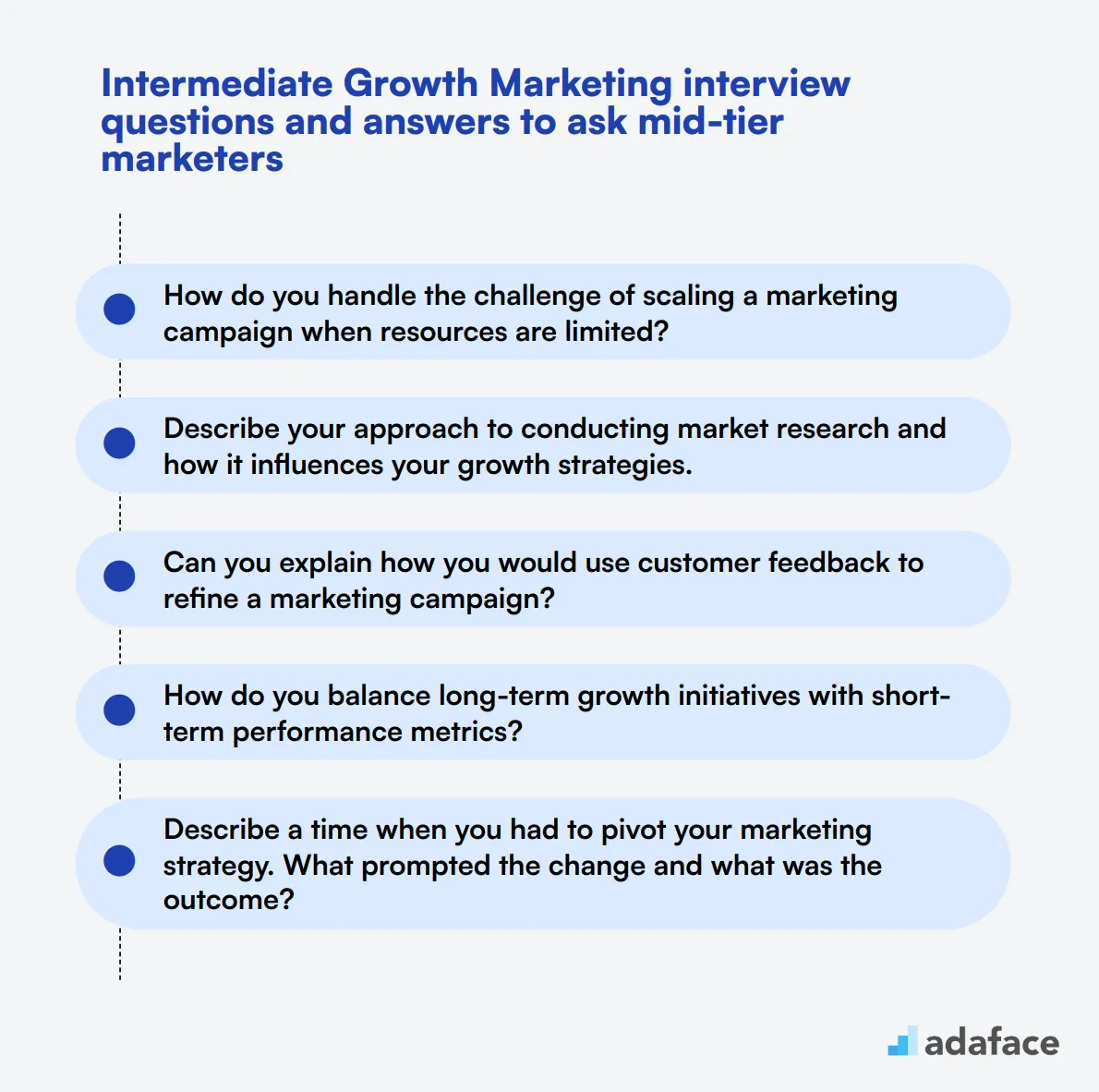
For recruiters and hiring managers looking to assess the capabilities of mid-tier marketers, this list of intermediate Growth Marketing interview questions is designed to provide valuable insights. Use these questions to evaluate candidates' practical knowledge and problem-solving skills to ensure they can drive meaningful growth for your organization.
- How do you handle the challenge of scaling a marketing campaign when resources are limited?
- Describe your approach to conducting market research and how it influences your growth strategies.
- Can you explain how you would use customer feedback to refine a marketing campaign?
- How do you balance long-term growth initiatives with short-term performance metrics?
- Describe a time when you had to pivot your marketing strategy. What prompted the change and what was the outcome?
- What techniques do you use to enhance user retention and reduce churn?
- How do you incorporate user experience (UX) principles into your growth marketing efforts?
- Explain a scenario where you had to collaborate with other departments to achieve your growth goals.
- How do you approach competitive analysis, and how does it inform your growth strategies?
- Discuss your experience with influencer marketing and its impact on growth.
- How do you ensure that your growth marketing efforts are aligned with the overall brand strategy?
- What role does personalization play in your marketing campaigns, and how do you implement it effectively?
7 Growth Marketing interview questions and answers related to growth strategies
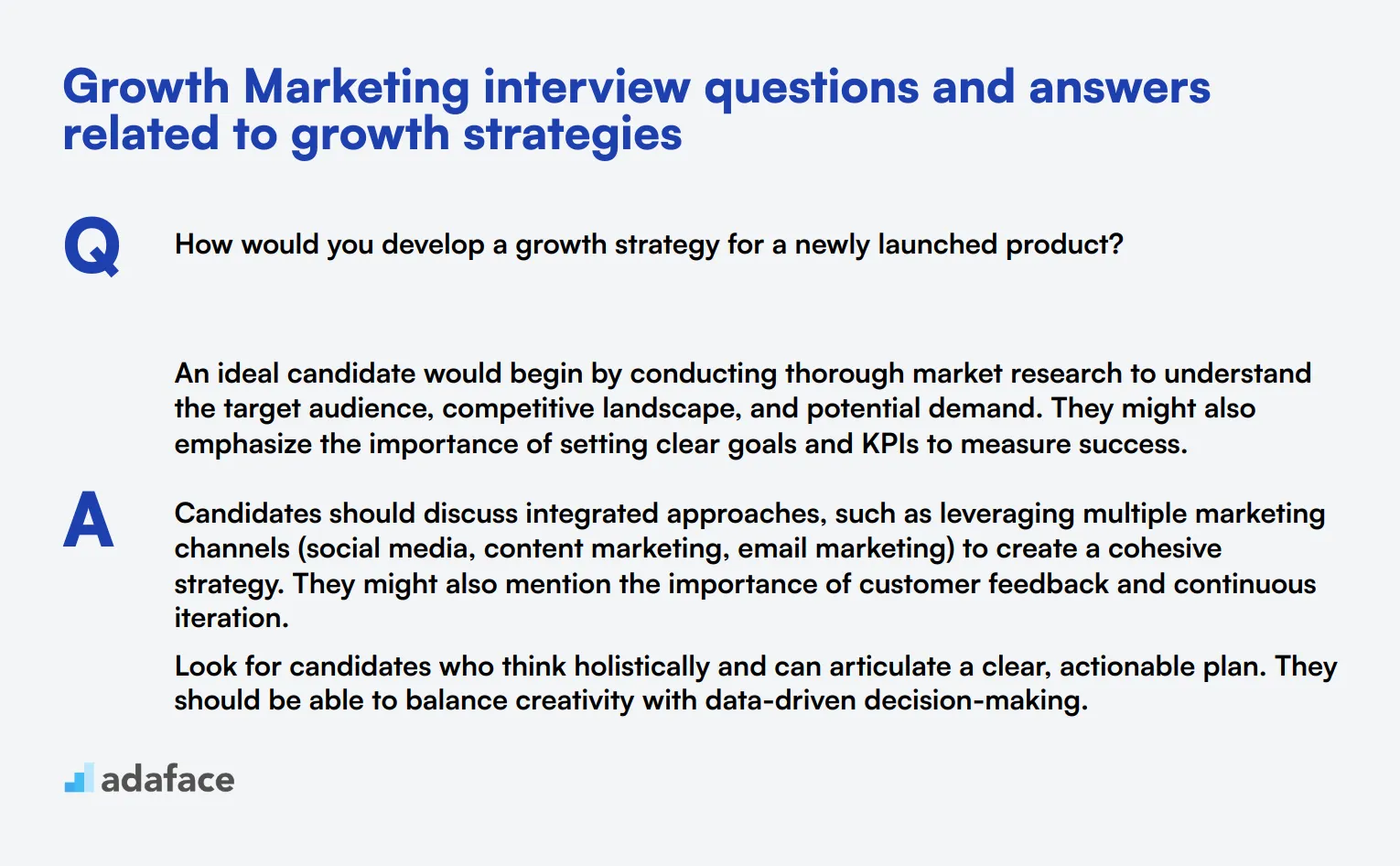
To ensure you're hiring a candidate who can effectively drive growth for your company, use these targeted interview questions. This list will help you assess their strategic thinking and practical experience in growth marketing.
1. How would you develop a growth strategy for a newly launched product?
An ideal candidate would begin by conducting thorough market research to understand the target audience, competitive landscape, and potential demand. They might also emphasize the importance of setting clear goals and KPIs to measure success.
Candidates should discuss integrated approaches, such as leveraging multiple marketing channels (social media, content marketing, email marketing) to create a cohesive strategy. They might also mention the importance of customer feedback and continuous iteration.
Look for candidates who think holistically and can articulate a clear, actionable plan. They should be able to balance creativity with data-driven decision-making.
2. Can you explain how you would perform a growth audit for an existing marketing campaign?
A growth audit involves analyzing the existing campaign's performance metrics, identifying strengths and weaknesses, and suggesting areas for improvement. Candidates should mention specific metrics like conversion rates, customer acquisition cost, and lifetime value.
They might discuss using data analytics tools to gather insights and performing A/B tests to optimize different aspects of the campaign. The candidate should also stress the importance of aligning the campaign with broader business goals.
Ideal responses will be detail-oriented and demonstrate a strong understanding of both quantitative and qualitative analysis. Look for candidates who can provide specific examples or case studies from their past experience.
3. How would you approach creating a user acquisition strategy for a mobile app?
To develop an effective user acquisition strategy, a candidate should start by defining the target audience and understanding their behavior. This involves market research and identifying key demographics.
They should then discuss various acquisition channels like social media ads, influencer partnerships, and app store optimization. Additionally, they might mention the importance of tracking and optimizing user acquisition cost (UAC) and lifetime value (LTV).
Look for candidates who can provide a structured and multi-channel approach. An ideal candidate will also emphasize the importance of continuous testing and iteration to refine the strategy.
4. Describe how you would implement a referral program to drive growth.
A referral program leverages existing customers to attract new ones. Candidates should explain how they would design the program to be simple and attractive, offering compelling incentives for both referrers and referees.
They might discuss the mechanics of the program, such as the referral tracking system and communication channels. The candidate should also mention how they would promote the program through various marketing channels.
Look for candidates who can articulate a clear plan, including specific examples of successful referral programs they've managed. They should also emphasize the importance of monitoring and optimizing the program based on performance data.
5. How would you measure the impact of a growth marketing strategy?
Candidates should discuss key performance indicators (KPIs) like customer acquisition cost (CAC), lifetime value (LTV), conversion rates, and retention rates. They should explain how these metrics provide insights into the effectiveness of their strategies.
They might also mention using tools like Google Analytics, CRM systems, and marketing dashboards to track these metrics. Furthermore, they should emphasize the importance of regular reporting and analysis to make data-driven decisions.
Ideal candidates will demonstrate a comprehensive understanding of both leading and lagging indicators. They should be able to articulate how they use these metrics to refine and optimize their strategies continuously.
6. How do you ensure that growth experiments are scientifically valid and reliable?
To ensure validity and reliability, candidates should stress the importance of setting up controlled experiments with clear hypotheses and measurable outcomes. They might mention techniques like randomization and control groups.
They should also discuss the importance of statistical significance and the need for sufficient sample sizes to draw reliable conclusions. Lastly, they might emphasize the importance of documenting and reviewing each experiment to learn and iterate.
Look for candidates who can provide specific examples of how they've implemented rigorous testing methodologies. They should also be able to explain how they use the results to make informed decisions.
7. Can you describe a time when you successfully pivoted a growth strategy?
Candidates should provide a specific example where they identified that a current strategy wasn't yielding the desired results. They should explain how they analyzed the situation, identified the issues, and developed a new approach.
They might discuss the actions they took to implement the new strategy, such as reallocating resources, changing marketing channels, or adjusting messaging. They should also mention the outcomes and how the pivot led to improved performance.
Look for candidates who demonstrate adaptability and problem-solving skills. They should be able to articulate the thought process behind the pivot and provide measurable results that highlight their success.
10 Growth Marketing interview questions about measurement and analytics
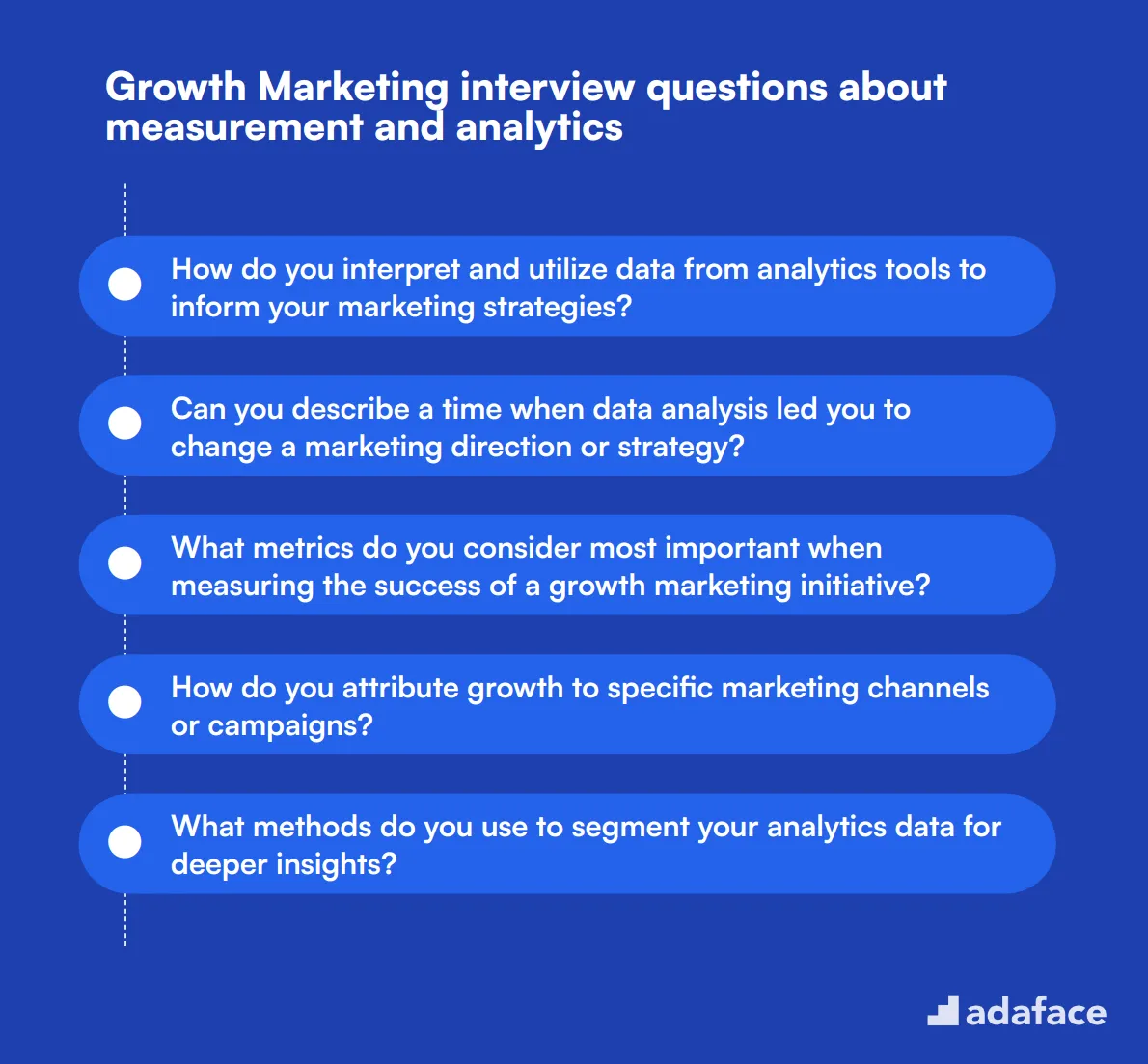
To evaluate if candidates can effectively measure and analyze growth marketing efforts, use this set of insightful questions. These questions will help you assess their ability to leverage data for driving growth, ensuring that their skills align with the requirements of a successful growth marketing role. For more details on specific job roles, check out our growth marketer job description.
- How do you interpret and utilize data from analytics tools to inform your marketing strategies?
- Can you describe a time when data analysis led you to change a marketing direction or strategy?
- What metrics do you consider most important when measuring the success of a growth marketing initiative?
- How do you attribute growth to specific marketing channels or campaigns?
- What methods do you use to segment your analytics data for deeper insights?
- How do you integrate qualitative data, such as customer feedback, with quantitative analytics?
- Can you explain how you would set up a dashboard to monitor key growth metrics?
- What role do cohort analysis and retention metrics play in your growth strategy?
- How would you use data visualization to present your findings to stakeholders?
- Describe how you would validate the results of a growth experiment.
Which Growth Marketing skills should you evaluate during the interview phase?
It is challenging to evaluate every aspect of a candidate’s capabilities in a single interview. However, focusing on core Growth Marketing skills can provide significant insights. Below, we discuss pivotal skills you should assess during the interview phase to ensure you hire the right fit for your team.
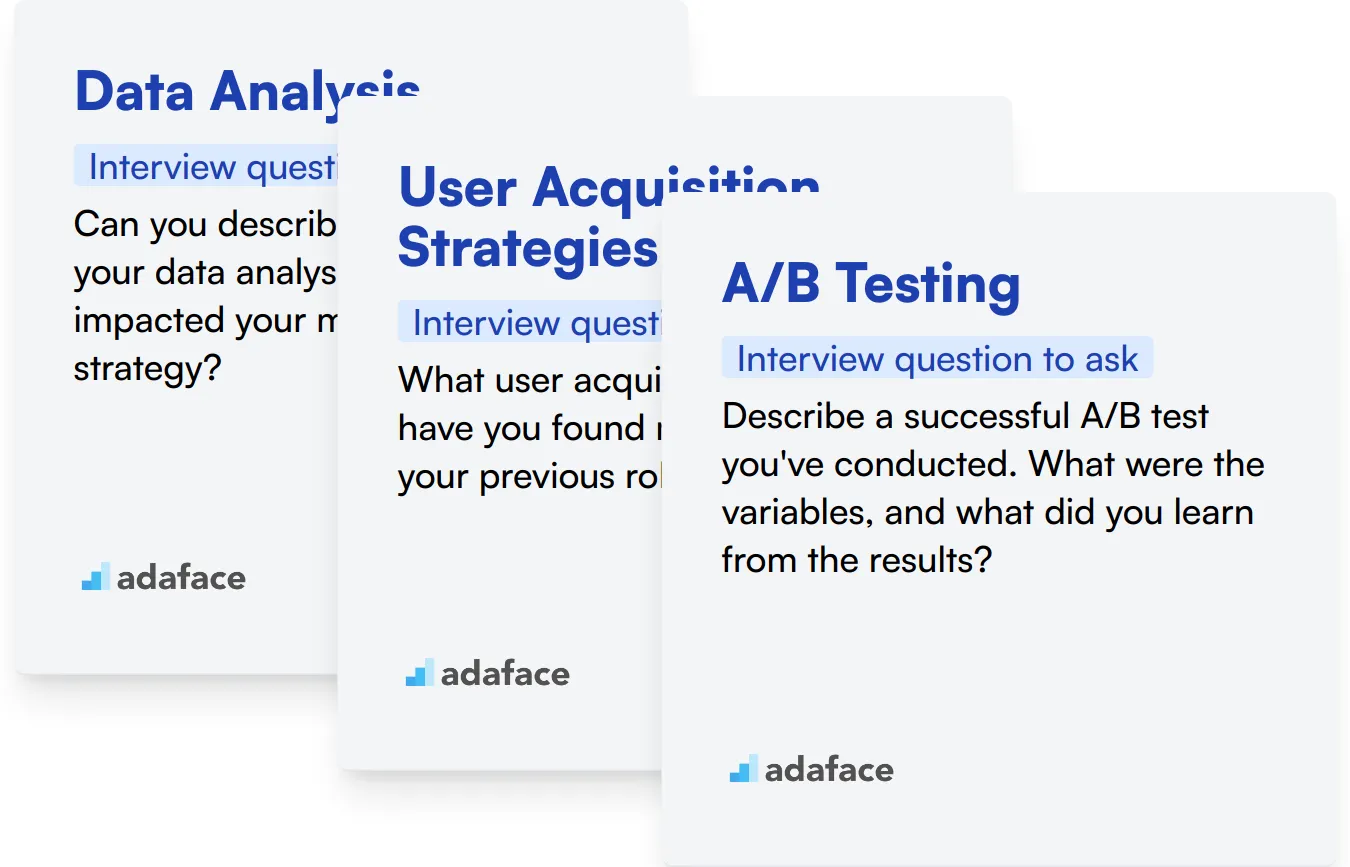
Data Analysis
Data is at the heart of Growth Marketing. A marketer's ability to collect, interpret, and leverage data to drive decision-making and optimize campaigns is crucial for success. Proficiency in data analysis helps in identifying trends, understanding user behavior, and making informed decisions to enhance growth.
You can administer an Adaface Data Analysis Test that includes relevant MCQs to gauge a candidate's proficiency in data analysis.
Additionally, you can ask targeted interview questions to evaluate this skill in-depth.
Can you describe a time when your data analysis significantly impacted your marketing strategy?
Look for specific examples where the candidate used data analysis to drive significant results. The candidate should be able to explain the data collection process, tools used, insights gathered, and the subsequent actions taken based on the data.
User Acquisition Strategies
User acquisition is a critical component of Growth Marketing. It involves leveraging various channels to attract new users and convert them into loyal customers. Understanding and implementing multiple user acquisition strategies can help scale a business rapidly and efficiently.
Consider using the Adaface Growth Marketing Test to filter out candidates based on their knowledge of user acquisition strategies.
In the interview, you can assess this skill further through targeted questions.
What user acquisition strategies have you found most effective in your previous roles, and why?
Pay attention to the specificity and variety of strategies mentioned. The candidate should demonstrate a deep understanding of different channels, their application, and effectiveness. Look for examples and results from past experiences.
A/B Testing
A/B testing is essential for optimizing marketing efforts and improving user experiences. By comparing variations of campaigns or webpages, marketers can identify what works best and make data-driven decisions to enhance performance.
You can utilize the Adaface A/B Testing Test to assess a candidate's knowledge and experience with A/B testing methodologies.
You can also ask targeted questions during the interview to delve deeper into their understanding and experience.
Describe a successful A/B test you've conducted. What were the variables, and what did you learn from the results?
Look for a clear explanation of the hypothesis, the variables tested, the methodology used, and the outcomes. The candidate should demonstrate an ability to learn from the results and apply those insights to future campaigns.
Hire Top Growth Marketing Talent with Skills Tests and Interview Questions
Looking to hire a skilled Growth Marketer? It's important to make sure candidates have the right skills for the job. A mix of technical know-how and creative thinking is key for this role.
One of the best ways to assess these skills is through a Growth Marketing test. This test can help you quickly identify candidates with the right mix of skills for your team.
After using the test to shortlist top applicants, you can invite them for interviews. Use the interview questions from this post to dig deeper into their experience and problem-solving abilities.
Ready to start hiring? Sign up to use our Growth Marketing test and other assessment tools. Our online assessment platform can help streamline your hiring process.
Growth Marketing Test
Download Growth Marketing interview questions template in multiple formats
Growth Marketing Interview Questions FAQs
Common questions include inquiries about user acquisition strategies, data analytics, and specific skills for junior and mid-tier marketers.
Understand the key competencies required for the role, such as data analysis, user acquisition strategies, and overall marketing tactics.
Role-specific questions help assess the candidate’s hands-on experience and their ability to implement successful marketing strategies.
While they are tailored for Growth Marketing, many questions can be adapted for other marketing positions by focusing on relevant skills.
Ask questions about their experience with data analysis tools, their approach to measuring campaign success, and specific examples of how data has informed their decisions.
A good Growth Marketer is analytical, creative, and has a proven track record of driving user acquisition and engagement through data-driven strategies.

40 min skill tests.
No trick questions.
Accurate shortlisting.
We make it easy for you to find the best candidates in your pipeline with a 40 min skills test.
Try for freeRelated posts
Free resources




